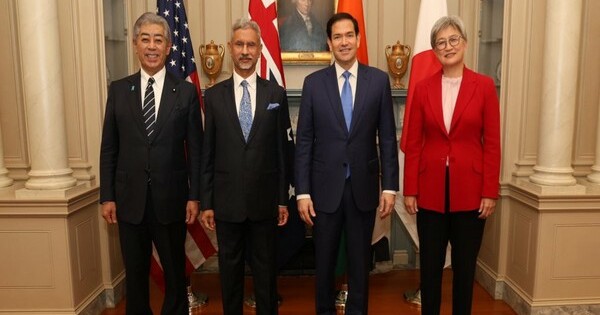Quad Foreign Ministers Reaffirm Commitment to a Free and Open Indo-Pacific
Quad Foreign Ministers met in Washington, DC, to emphasize commitment to a free Indo-Pacific amid concerns over East China Sea tensions.
Page views: 2

The Foreign Ministers of the Quadrilateral Security Dialogue, also known as the Quad, convened in Washington, DC, on July 1. This high-level meeting underscored the collective resolve of the United States, India, Japan, and Australia to ensure a free and open Indo-Pacific region.
US Secretary of State Marco Rubio, along with India's External Affairs Minister S Jaishankar, Japan's Minister of Foreign Affairs Takeshi Iwaya, and Australian Foreign Minister Penny Wong participated in the discussions. The primary focus was to address ongoing security and stability issues in the region, particularly in the East China Sea and South China Sea, which have been points of tension and international concern.
During the meeting, the Quad ministers reiterated their commitment to uphold international law and respect for sovereignty. They emphasized the importance of maintaining a rules-based maritime order in the Indo-Pacific, which is vital for regional peace and prosperity. The ministers expressed their unified stance against any coercive actions that could alter the status quo or threaten the territorial integrity of nations within the region.
The discussions also touched upon the enhancement of cooperation in areas such as cybersecurity, climate change, and infrastructure development. These collaborative efforts aim to bolster economic resilience and sustainable growth in the Indo-Pacific.
The meeting in Washington, DC, demonstrated the Quad's proactive approach to addressing regional challenges through diplomatic dialogue and strategic partnerships. As tensions persist in the Indo-Pacific, the Quad's commitment serves as a stabilizing force, emphasizing the importance of unity and shared values among democratic nations.
The joint statement released after the meeting reflects the Quad's dedication to promoting peace, stability, and prosperity in the Indo-Pacific, reinforcing their role as a pivotal force in shaping the geopolitical landscape of the region.
Published on: July 2, 2025, 5:02 pm



